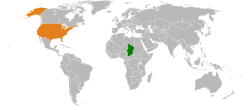Chad–United States relations
 |
|
Chad |
United States |
|---|---|
Chad–United States relations are the international relations between Chad and the United States.
According to the 2012 U.S. Global Leadership Report, 81% of Chadians approve of U.S. leadership, with 18% disapproving and 1% uncertain, the fourth-highest rating for any surveyed country in Africa.[1]
US missions
The American embassy in N'Djamena, established at Chadian independence in 1960, was closed from the onset of the heavy fighting in the city in 1980 until the withdrawal of the Libyan forces at the end of 1981. It was reopened in January 1982. The U.S. Agency for International Development (USAID) and the U.S. Information Service (USIS) offices resumed activities in Chad in September 1983
History
United States interest in Chad increased steadily during the 1980s, as United States opposition to Libyan leader Muammar Gaddafi intensified and Chadian instability threatened to contribute to regional destabilization. During the 1960s and 1970s, the United States and Chad had maintained fairly low-level economic ties, including investment guarantees and project aid, such as Peace Corps involvement. Drought in the early 1970s brought United States food and agriculture aid to remote areas, including grain supplies, animal health services, and technical assistance. Other economic agreements included road building in the Lake Chad area and rural community development.
Although the United States considered Chad part of France's sphere of influence, it also provided a low level of military assistance until 1977. President Félix Malloum's 1978 request for increased military aid to fight the FROLINAT insurgency coincided with a marked increase in Soviet activity in Africa, especially in Ethiopia, and increased Soviet arms shipments to Libya. United States relations with African states were redefined in accordance with the new strategic value assigned to African allies, and United States foreign policy shifted accordingly. Thus, in the 1980s United States interest and involvement in Chad increased.
For a time in the early 1980s, the United States commitment to military support for Habré was more enthusiastic than that of France, which hoped to preserve its relationship with Libya. Although military and financial aid to Habré increased, by 1988 United States advisers had begun to stress the need to reconcile warring factions and pacify rebel groups within Chad. United States support to Chad included several economic and military aid agreements, including training programs to improve the effectiveness of Habré's administration and to bolster public confidence in the government and intelligence-sharing to assist in countering Libyan forces in 1987.
The United States enjoys cordial relations with the government of Idriss Déby. Chad has proved a valuable partner in the global war on terror, and in providing shelter to approximately 200,000 refugees of Sudan's Darfur crisis along its eastern border.
Before permanently closing its Chad mission in 1995 because of declining funds and security concerns, USAID's development program in Chad concentrated on the agricultural, health, and infrastructure sectors. It also included projects in road repair and maintenance, maternal and child health, famine early warning systems, and agricultural marketing. A number of American voluntary agencies (notably Africare and VITA) continue to operate in Chad. Peace Corps has traditionally had a large presence in Chad, with volunteers arriving during the postwar period in September 1987, then withdrawing in 1998. Peace Corps operations resumed in September 2003, with a group of 20 new volunteers. The second class of 17 volunteers arrived in September 2004. Both groups focused on teaching English; expansion into other areas was planned for 2005. Currently the Peace Corps presence in Chad is inactive.
In April 2007, Deputy Secretary of State John Negroponte visited Chad in light of the War in Darfur.[2]
Chad is a participant in the Trans-Saharan Counterterrorism Initiative and cooperates with the United States military in fighting al-Qaeda in the Islamic Maghreb (and affiliated) insurgents.
Education
The American International School of N'Djamena is in the Chadian capital.
See also
References
- ↑ U.S. Global Leadership Project Report - 2012 Gallup
- ↑ Fisher-Thompson, Jim (18 April 2007). "State's Negoponte Thanks Chad for Aiding Darfur Refugees". IIP Digital. United States Department of State. Retrieved 23 January 2015.
![]() This article incorporates public domain material from the United States Department of State website http://www.state.gov/r/pa/ei/bgn/index.htm (Background Notes).
This article incorporates public domain material from the United States Department of State website http://www.state.gov/r/pa/ei/bgn/index.htm (Background Notes).
"Popular Baby Names". Social Security Administration.
External links
![]() This article incorporates public domain material from the Library of Congress Country Studies website http://lcweb2.loc.gov/frd/cs/.
This article incorporates public domain material from the Library of Congress Country Studies website http://lcweb2.loc.gov/frd/cs/.
.svg.png)